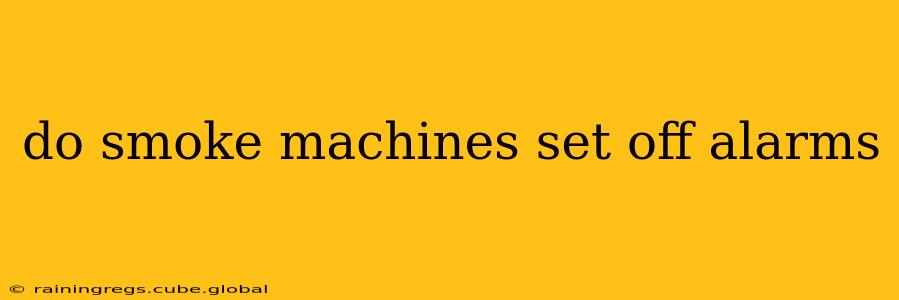Do Smoke Machines Set Off Alarms? A Comprehensive Guide
Smoke machines, also known as fog machines or haze machines, are commonly used in various settings, from theatrical productions and concerts to parties and Halloween events. However, a common concern is whether these devices could trigger smoke detectors or fire alarms. The answer isn't a simple yes or no, as it depends on several factors. This guide will delve into the specifics, addressing common questions and concerns.
What kind of smoke do smoke machines produce?
Smoke machines don't produce actual smoke in the traditional sense (like burning wood or paper). Instead, they create a fog or haze using a fluid-based solution that's heated and atomized. This fluid is typically composed of water, glycerin, and sometimes other additives to enhance the visual effects. Crucially, this is not combustible material.
How do smoke detectors work?
Smoke detectors typically use one of two methods: photoelectric or ionization. Photoelectric detectors sense smoke particles that obstruct a light beam. Ionization detectors use a small radioactive source to ionize the air; smoke particles disrupt this ionization, triggering the alarm.
Will a smoke machine set off a photoelectric smoke detector?
The dense fog produced by a smoke machine can set off a photoelectric smoke detector. The high concentration of particles in the air, even though not combustible, can block the light beam, triggering a false alarm. The likelihood of this happening depends on the sensitivity of the detector and the amount of fog present.
Will a smoke machine set off an ionization smoke detector?
Smoke machines are less likely to trigger ionization smoke detectors. This is because the particles produced are not the type of combustion particles that these detectors are designed to detect. However, a very high concentration of fog could still potentially cause a false alarm by physically interfering with the sensor's operation.
What factors influence whether a smoke machine will set off an alarm?
Several factors influence the likelihood of a false alarm:
- Type of smoke detector: As discussed, photoelectric detectors are more susceptible to false alarms from smoke machines than ionization detectors.
- Density of the fog: A heavier, denser fog increases the chances of triggering a detector.
- Sensitivity of the detector: Older or more sensitive detectors are more likely to react to the fog.
- Ventilation: Good ventilation can significantly reduce the concentration of fog in the air, decreasing the risk of triggering an alarm.
What precautions should I take when using a smoke machine?
- Check with your venue: If using a smoke machine in a public space or rental property, always check with the venue management to ensure it's permitted and doesn't violate fire safety regulations.
- Use in well-ventilated areas: Ensure adequate ventilation to help disperse the fog and reduce its concentration.
- Test your detectors: Regularly test your smoke detectors to ensure they are functioning properly.
- Monitor the smoke machine: Keep a close eye on the machine while it's in operation to prevent malfunctions or excessive fog production.
- Consider alternative effects: If false alarms are a significant concern, explore alternative visual effects that don't produce fog or haze.
In conclusion, while smoke machines aren't inherently designed to set off alarms, the potential for false alarms exists, particularly with photoelectric detectors and in poorly ventilated spaces. By understanding how smoke detectors work and taking appropriate precautions, you can minimize the risk of unwanted alarms and enjoy the visual effects of your smoke machine safely.
